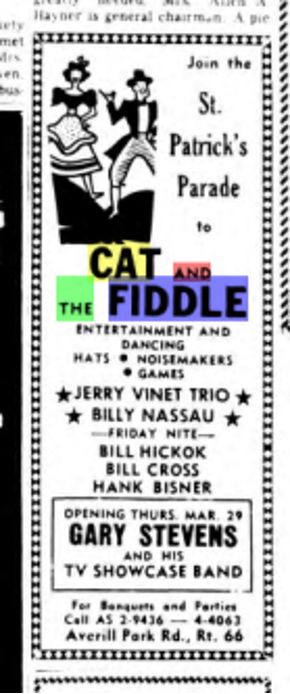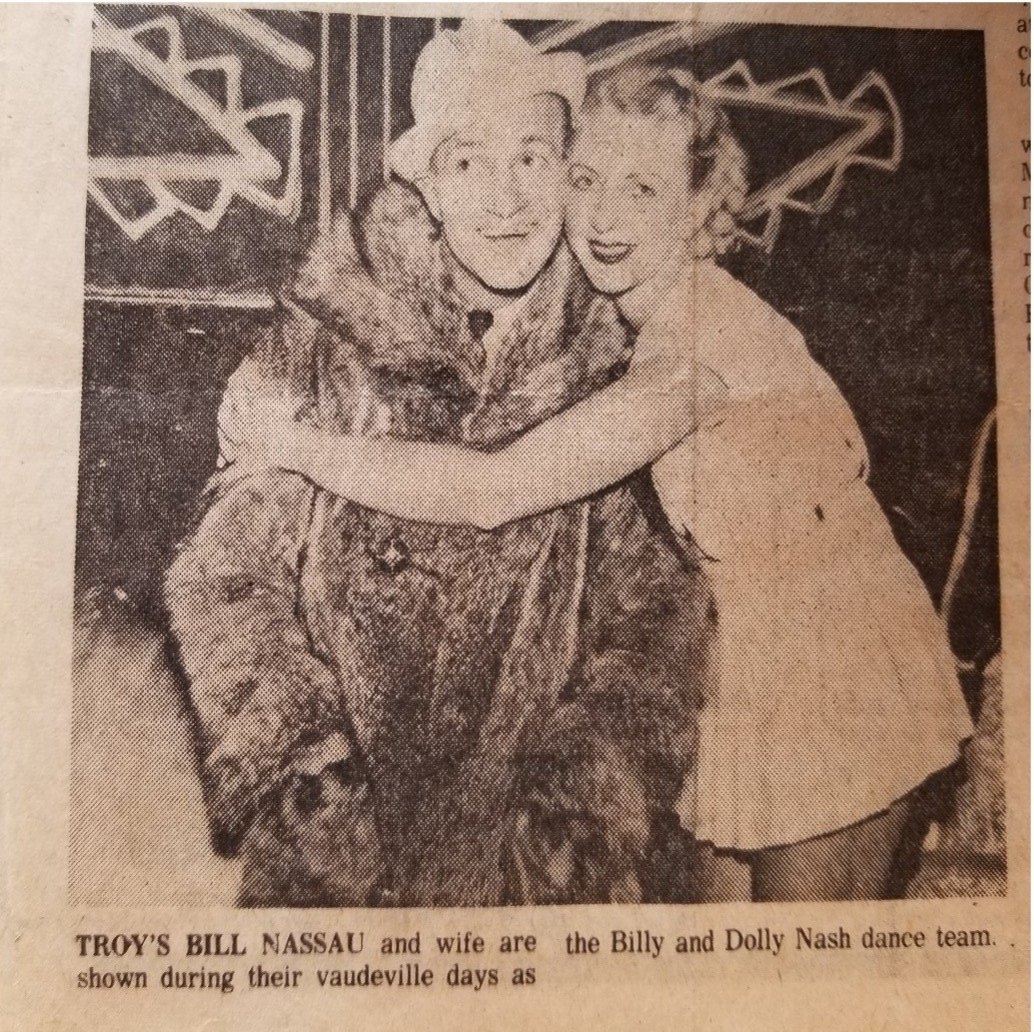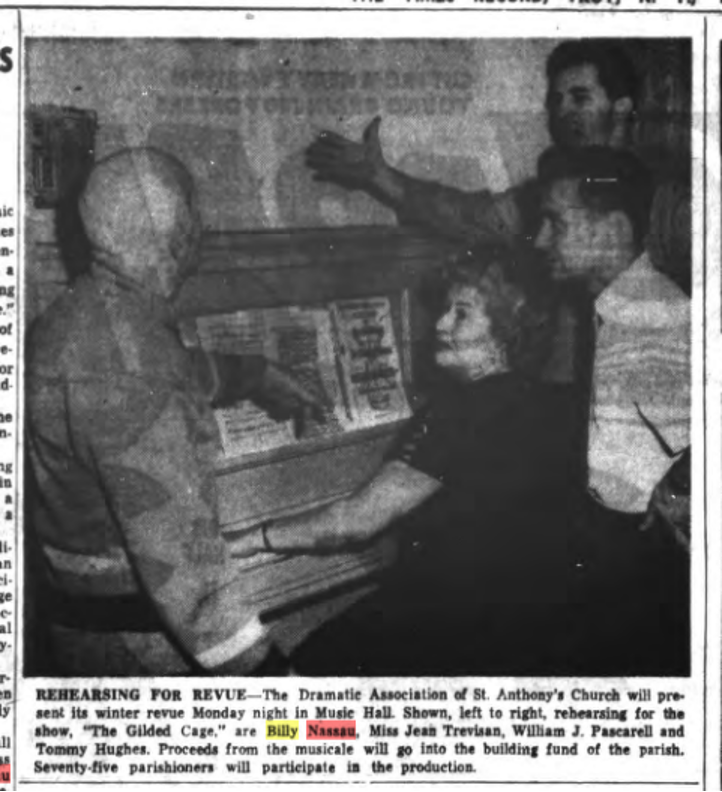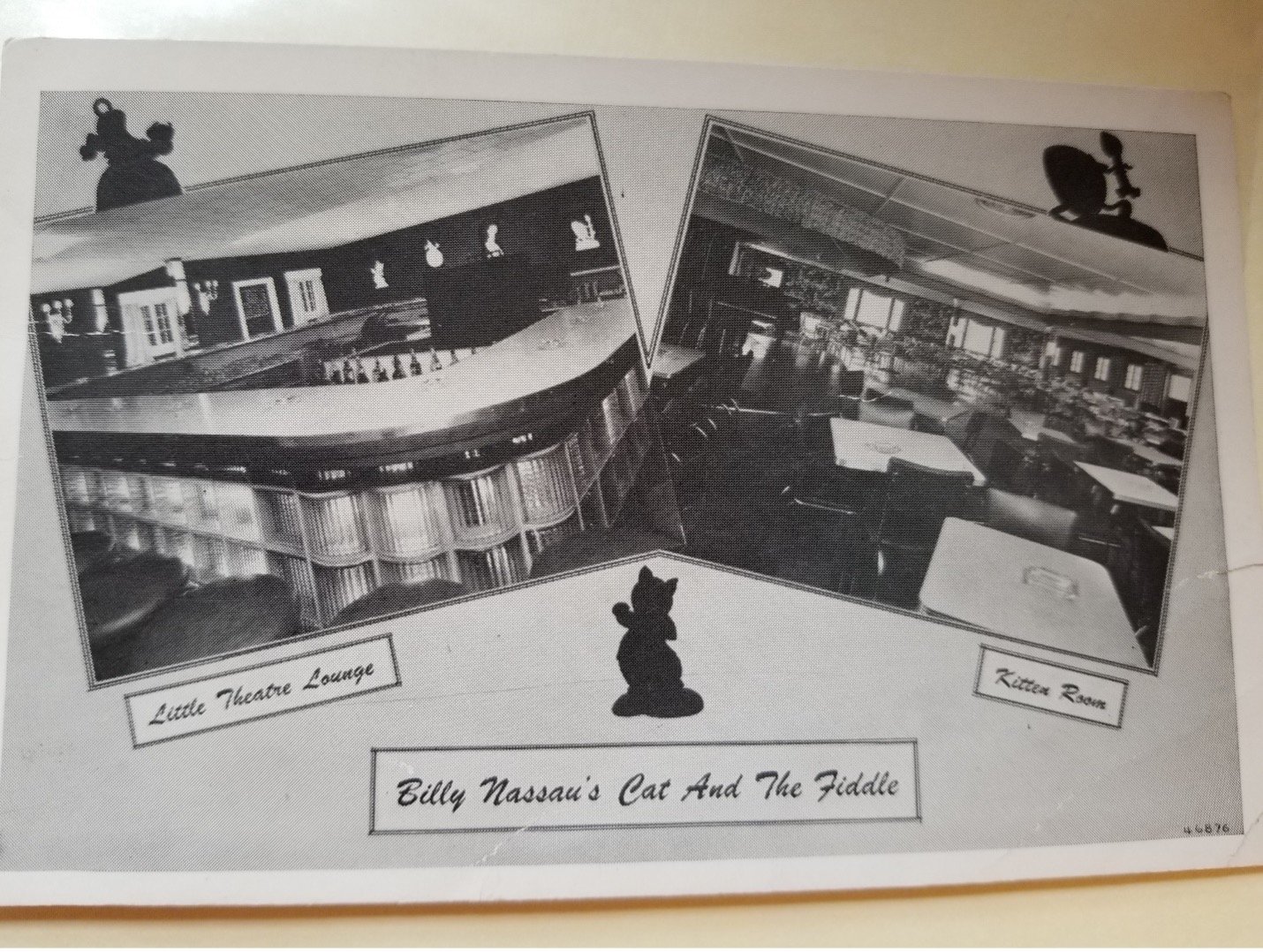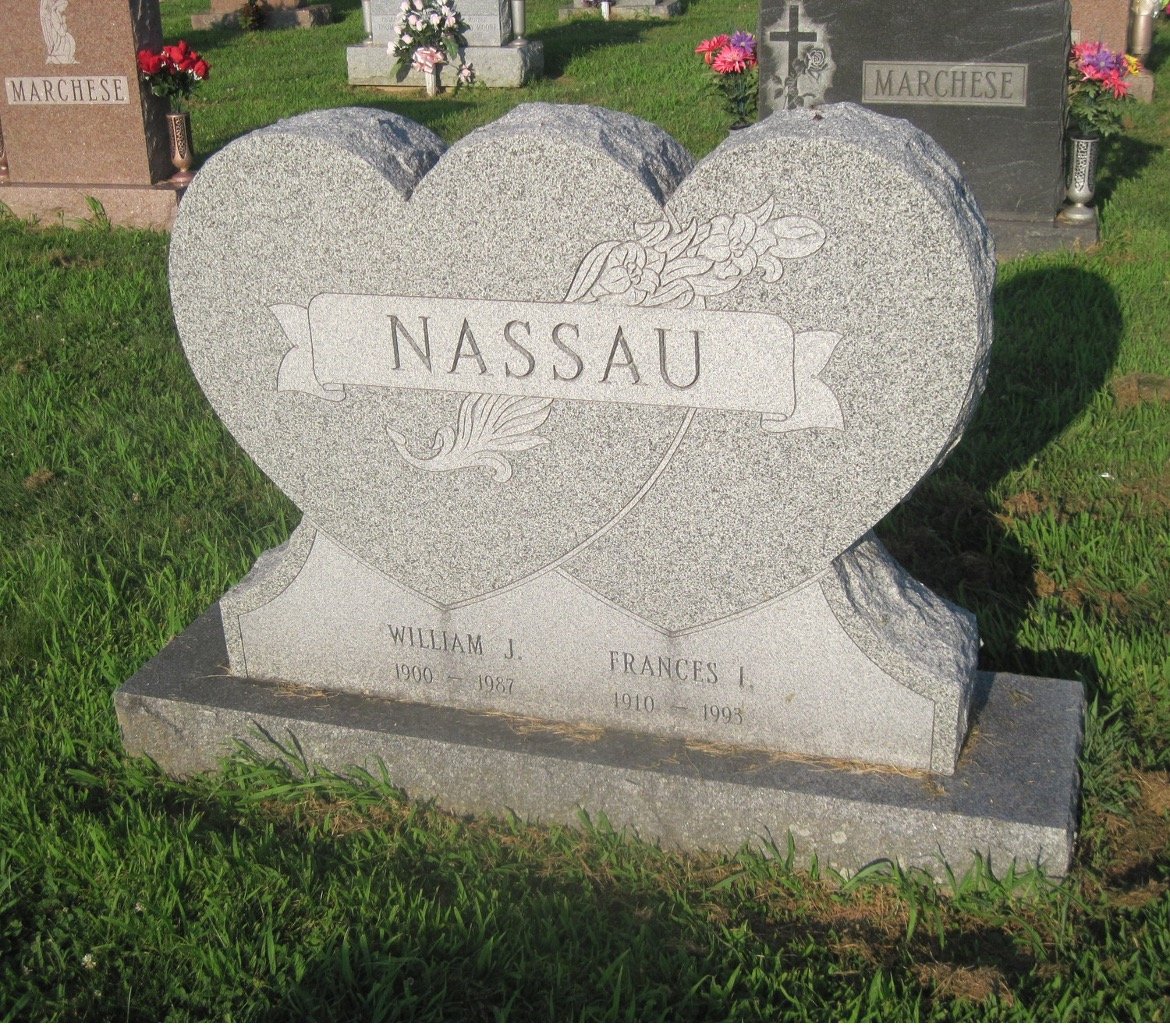Troy's Favorite Son
Billy Nassau
Performer and Philanthropist
Billy Nassau, “Troy’s favorite son”, was a vaudevillian in the 1920’s-1930’s, a nightclub performer and owner, and a community philanthropist.
Photo of Billy Nassau in his performing days, n.d.
Nassau Collection at the Hart Cluett Museum
He was born in 1900 as William Nassour, the son of Kalil or Kaleek Nassour and his wife Marie (Katherine). The Nassours came to the U.S. in 1894 and though the census reports them either as Syrian or Turkish, Katherine’s obituary (Troy Times Record, Sept. 16, 1959) states that they were Lebanese. By 1900, Kaleek had a dry goods store at 1447 5th Avenue, across the street from the current Italian Community Center, just south of Ferry Street. Katherine’s obituary says they were the first Lebanese in the area, and that Kaleek specialized in wholesaling fleece-lined merchandise, locally made. In 1910 the Nassours bought 144 4th Street, now part of Vicina apartments and were members of the Maronite Church, St. Anne’s, on 4th Street. The family altered the last name to Nassau following the death of Kaleek in 1918. Marie Nassau continued to run a ladies’ clothing store at 144 4th Street until the 1940’s and helped other immigrants to establish homes here.
Billy Nassau in black face, n.d.
Nassau Collection at the Hart Cluett Museum
An apocryphal story says that Billy began performing in night clubs as a teenager, quitting when his father found out. That may have been, but what is sure is that the diminutive Billy, 5’1” and 140 pounds on his World War II draft card in 1942, worked as a laborer, collar factory packer, and fruit dealer before calling himself “actor” in the 1926 Troy City Directory. He had already been working as a performer for a few years and he began his community philanthropy at the same time. In 1922, the Knights of Columbus had a fundraiser to aid a new parish, featuring Billy Nassau’s Harmony Boys, with songs and dances. “The troupe has already appeared in many places in and around Troy. Their success as minstrels is established. (Troy Times, 1 Nov. 1922)
An article from the Troy Times on September 17, 1923 announced that WHAZ, the pioneering radio station at RPI, would feature Art Vinett and his dance orchestra, with tenor solos by Billy Nassau. WHAZ was the second oldest radio station in the area, less than a year old at this point, and one of the first stations in the country. The Times of December 29, 1924 reported that though he had just returned from a trip to the West Coast, Billy performed as part of a Knights of Columbus program to bring entertainers and gifts to the local Catholic orphanages. He did impersonations of Al Jolson and Eddie Cantor, two long-established stars, and sang “My Pa does Two Time, No time.” An undated news article in the Troy Times Record by Tom Thomas states that in 1925 Billy “starred at the weekly dances of the Emerald Club” in Watervliet.
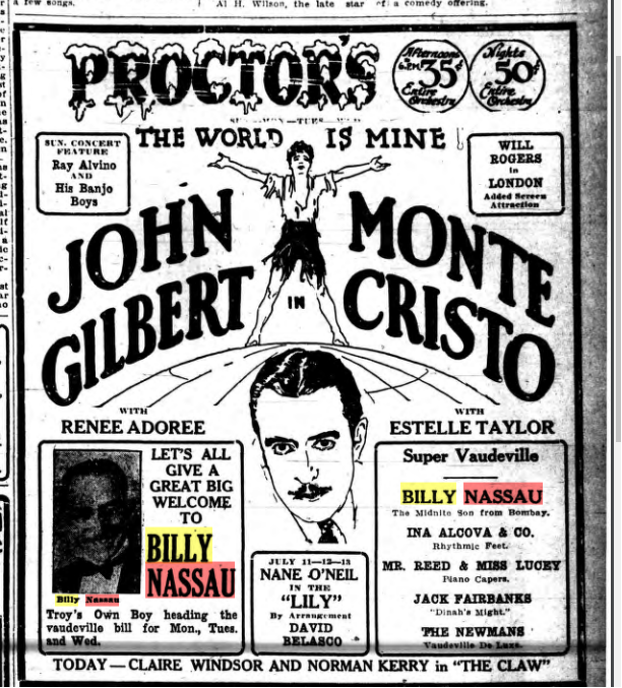
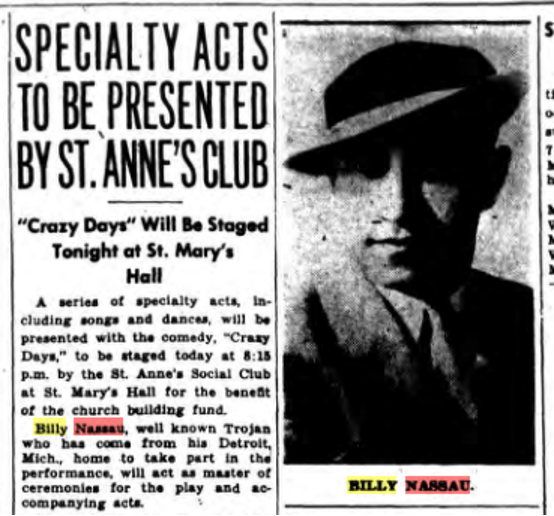
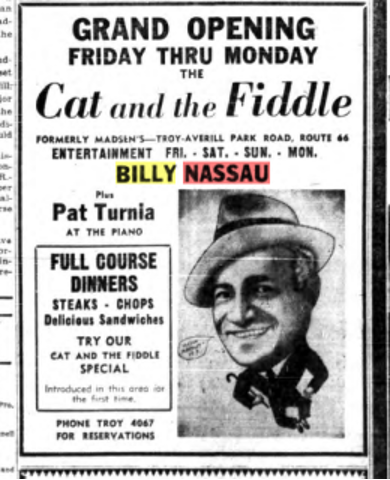
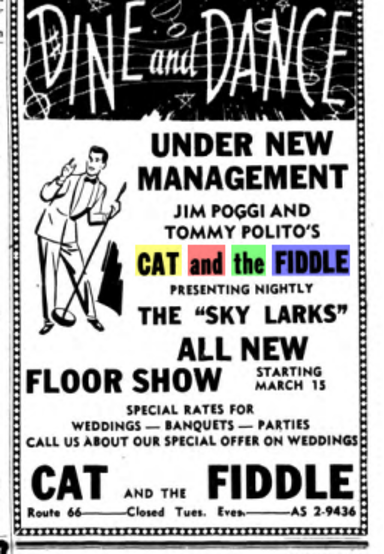
The Tom Thomas news story says he became a performer known as “Billy Nash” on the B. F. Keith Vaudeville Circuit. Vaudeville companies owned and/or managed hundreds of theaters in the U.S. in the 1920’s. A 1927 Proctor’s ad lists him as Billy Nassau, “Troy’s Own Boy heading the vaudeville bill… He “has been eagerly sought by vaudeville managers throughout the country…” He was billed as “The Midnite Son from Bombay” as “he is one of the funniest blackface comedians on the stage.”
The 1930 NY Census still listed Billy living in Troy, with his occupation as an actor in RKO. In 1928, two vaudeville circuits merged: the Keith and the Orpheum. Together they controlled 700 theaters and 15,000 performers (Wikipedia). They went on to join with Radio Corporation of American (RCA) later that year, forming the Radio Keith Orpheum Co., (RKO) a major motion picture studio. Did Billy appear in any films? Was he known as “Billy Nash”? Not that we have found so far.
Nassau Collection at the Hart Cluett Museum
Perhaps Billy didn’t like the travel that vaudeville demanded. The Tom Thomas news story says he was a headliner at a night club in Detroit, Michigan- “King of Clubs” for four years, and then at a club in Huron, Michigan- “Frankie and Johnnie’s” for fourteen. The public record confirms that he was an actor in Detroit in 1940, living with Frances Nassau, age 30. In fact, he married Frances Clunes in Toledo, Ohio the next year. She was a divorced actress. The Thomas story says her stage name was Dolly Frances and that they were a “dancing duo.” On his 1942 draft card for World War II, Billy stated he worked at “King of Clubs” in Detroit. As for Huron, Michigan, there is Port Huron, Michigan, north of Detroit, on Lake Huron and the border of Canada. Did he work there?
Billy returned to Troy in 1945, “from his home in Detroit, Mich.”, to take part in fundraising for the St. Anne’s Social Club. He was to be master of ceremonies. He and Frances had moved here by 1948, when they opened a nightclub/bar/restaurant on Route 66 in Averill Park, “The Cat and the Fiddle” (Troy Times Record May 26, 1948). The 1950 US Census listed the family living in East Greenbush with son William, 7, and daughter Mary Jane, 4. Billy, 50, was “operator, night club” , and Frances, “cashier, restaurant.”
The Troy Times Record ran many ads for “The Cat and the Fiddle” through 1957. Some were for special shows at the night club, for example for St. Patrick’s Day or New Year’s Eve. Small news stories reported wedding receptions, award dinners, and other group banquets taking place there. In 1957, the ads stated that Jim Poggi and Tommy Polito were the new managers, then in 1958 that the business had been sold and was now “The Downbeat Club.”
Meanwhile, Billy and Frances were raising their family. Billy copyrighted a song, “Troy is the Home of Uncle Sam” in 1959. And he continued to be the organizer, master of ceremonies, featured entertainer, and headliner of many, many fund raising shows for St Anne’s and other local Catholic churches. A typical one from February 25, 1965 lists Billy leading the choral units in “The Gilded Cage”, put on by the dramatic association of St. Anthony’s Church, its annual winter revue. He was emcee for the annual variety shows of LaSalle Institute through the early 1970’s.
St Mary’s Cemetery, Find-a-Grave
Billy died in 1987, Frances in 1992. They are buried in St. Mary’s Cemetery, Troy. The summary article about Billy by Tom Thomas was written on the occasion of a thank-you gala to be held for him. It stated he had “raised thousands of dollars for local organizations over the years.” From the evidence, it was for fifty years - quite a record.
Blog post and research by Schaghticoke Town Historian and HCM Volunteer, Christina S. Kelly.




